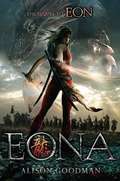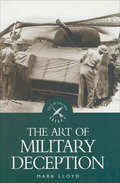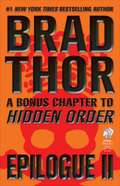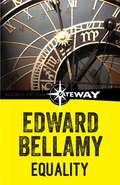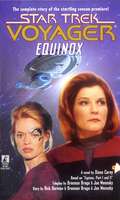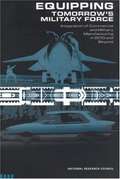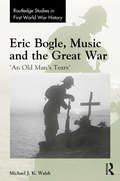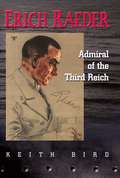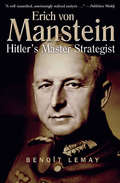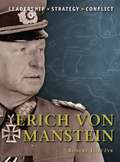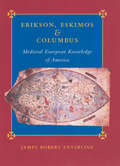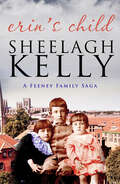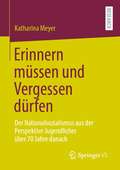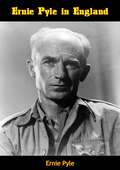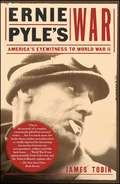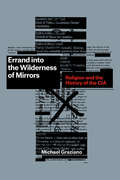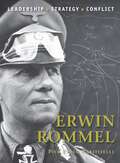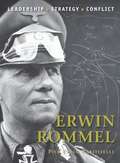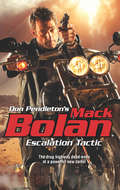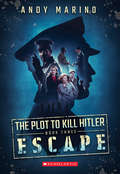- Table View
- List View
Eona: The Last Dragoneye (Eon #2)
by Alison GoodmanEon has been revealed as Eona, the first female Dragoneye in hundreds of years. Along with fellow rebels Ryko and Lady Dela, she is on the run from High Lord Sethon's army.
Epehy: Hindenburg Line (Battleground Ser.)
by Bill MitchinsonThe village of Epehy gave its name to one of the most important battles of 1918.Evacuated by the Germans during their retreat to the Hindenburg Line, the ruins were occupied by British Forces until the German offensive. They were recaptured in some of the bloodiest engagements of September 1918.
Epilogue II: A Bonus Chapter to Hidden Order (The Scot Harvath Series)
by Brad ThorIf you read and loved the #1 New York Times bestseller Hidden Order, enjoy this free bonus chapter.Experience the suspense and thrills only Brad Thor can write in Epilogue II, a shocking alternate ending to Hidden Order.
Epistolary Constructions of Post-World War I Identity: The Invisibility of Minority Groups
by Manel HeratThis book analyses the letters of marginalised groups of World War I soldiers - including Black, Indian and disabled ex-servicemen - from a linguistic perspective, looking at issues such as descriptions of disability, identity and migration, dealing with minority groups who have long been rendered invisible, and exploring how these writers position themselves in relation to the 'other'. The author makes use of a corpus-assisted approach to examine identity construction and performance, shedding light on a previously under-explored demographic. This book will be of interest to students and scholars of World War I history, language and identity, psychological and physical disability, as well as readers seeking a fresh angle on a key period of 20th century history.
Equality
by Edward BellamyThe sequel to Bellamy's Looking Backward where a young man falls asleep in 1887 and wakes in a utopian year 2000, where all social ills are solved. This novel continues the thread of his utopian vision.Equality begins when Julian West returns to the year 2000 to continue his education. The book describes an ideal society in that year.
Equinox (Star Trek: Voyager)
by Diane CareyCaptain Janeway believed she commanded the only Starfleet vessel in the Delta Quadrant -- until the U.S.S. Voyager came to the rescue of the U.S.S. Equinox, a battered starship besieged by a ravening horde of extradimensional predators. Helmed by Captain Rudolph Ransom, the Equinox has been trapped in the Delta Quadrant even longer than the Voyager and the ship and its crew show the scars of a constant struggle to survive. But Ransom and his people are hiding something as well: a shocking secret that will ultimately pit captain against captain, starship against starship, in an explosive conflict that may cost Voyager the life of her captain! A powerful novel based on the thrilling two-part television adventure!
Equipping Tomorrow's Military Force: Integration of Commercial and Military Manufacturing in 2010 and Beyond
by National Research CouncilInformation on the Integration of Commercial and Military Manufacturing in 2010 and Beyond
Equity of Evolving Transportation Finance Mechanisms
by The National Academy of SciencesTRB Special Report 303: Equity of Evolving Transportation Finance Mechanisms addresses the equity of alternatives to current transportation finance mechanisms, notably mechanisms based on tolling and road use metering (i.e., road pricing). The committee that developed the report concluded that broad generalizations about the fairness of high-occupancy toll lanes, cordon tolls, and other evolving mechanisms oversimplify the reality and are misleading. The fairness of a given type of finance mechanism depends on how it is structured, what transportation alternatives are offered to users, and which aspects of equity are deemed most important.
Eric Bogle, Music and the Great War: 'An Old Man's Tears' (Routledge Studies in First World War History)
by Michael J. WalshEric Bogle has written many iconic songs that deal with the futility and waste of war. Two of these in particular, ‘And the Band Played Waltzing Matilda’ and ‘No Man’s Land (a.k.a. The Green Fields of France)’, have been recorded numerous times in a dozen or more languages indicating the universality and power of their simple message. Bogle’s other compositions about the First World War give a voice to the voiceless, prominence to the forgotten and personality to the anonymous as they interrogate the human experience, celebrate its spirit and empathise with its suffering. This book examines Eric Bogle’s songs about the Great War within the geographies and socio-cultural contexts in which they were written and consumed. From Anzac Day in Australia and Turkey to the ‘The Troubles’ in Northern Ireland and from small Aboriginal communities in the Coorong to the influence of prime ministers and rock stars on a world stage, we are urged to contemplate the nature and importance of popular culture in shaping contemporary notions of history and national identity. It is entirely appropriate that we do so through the words of an artist who Melody Maker described as ‘the most important songwriter of our time’.
Erich Raeder
by Keith BirdFrom 1928 to 1943, Erich Raeder led the German navy during the last turbulent years of the Weimar Republic, the rise of Hitler, and through World War II, yet until now there has not been a full-length biography written about him. This study draws on archival resources and the rich scholarship of German naval history over the past five decades to review the evolution of Raeder's concept of naval strategy and his attempts to achieve the political and military means necessary to attain the navy's global naval ambitions. While previous histories have viewed Raeder as a product of the Wilhelmian era and heir to Admiral von Tirpitz's sea power ideology, this work clearly demonstrates the navy's affinity with Hitler's fascism. Author Keith Bird refutes Raeder's own argument that his navy was non-political and independent and shows him to be a political activist and the architect of German naval policy. For the first time, Raeder's strict leadership of the navy after 1928 and his relationship to Hitler and the National Socialist state is placed in the context of Raeder's formative years as an Imperial naval officer, his First World War combat experience, and his critical role in the survival and development of the post-war Reichsmarine. The author traces the impact of Hitler's influence on both the pace and nature of naval rearmament 1933-1939 and the conduct of the Kriegsmarine in war as well as Raeder's furtive attempts to influence Germany's strategic thinking in favor of a maritime strategy. Blinded by his need to justify the navy's existence and achieve his vision of world power, Raeder was ultimately defeated by the contradictions in his own policies as well as Hitler's and the realities of Germany's resources and military necessities.
Erich von Manstein: Hitler's Master Strategist
by Benoit LemayA Selection of the Military Book Club: An “informative and objective” biography of a genius commander and a study of his loyalty to the Nazi cause (Library Journal).To many close students of World War II, Erich von Manstein is considered the greatest commander of the war, if not the entire twentieth century. He devised the plan that conquered France in 1940, and led an infantry corps in that campaign. At the head of a panzer corps he reached the gates of Leningrad in 1941, then took command of 11th Army and conquered Sevastopol and the Crimea. After destroying another Soviet army in the north, he was given command of the ad hoc Army Group Don to retrieve the German calamity at Stalingrad, whereupon he launched a counteroffensive that, against all odds, restored the German front. Afterward he commanded Army Group South, nearly crushing the Soviets at Kursk, and then skillfully resisted their relentless attacks as he traded territory for coherence in the East.Though an undoubtedly brilliant military leader—whose achievements, considering the forces at his disposal, rivaled of Patton, Rommel, MacArthur, and Montgomery—surprisingly little is known about Manstein himself, save for his own memoir and the accolades of his contemporaries. In this book we finally have a full portrait of the man, including his campaigns, and an analysis of what precisely kept a genius like Manstein harnessed to such a dark cause.A great military figure, but a man who lacked a sharp political sense, Manstein was very much representative of the Germano-Prussian military caste of his time. Though Hitler was uneasy about the influence he’d gained throughout the German Army, Manstein ultimately declined to join any clandestine plots against his Führer, believing they would simply cause chaos, the one thing he abhorred. Though he constantly opposed Hitler on operational details, he considered it a point of loyalty to simply stand with the German state, in whatever form. Though not bereft of personal opinions, his primary allegiances were, first, to Deutschland, and second, to the soldiers under his command, who’d been committed against an enemy many times their strength.It is thus through Manstein that the attitudes of other high-ranking officers who fought during the Second World War, particularly on the Eastern Front, can be illuminated. This book is “a well-researched, convincingly reasoned analysis of a general widely considered one of WWII’s great commanders” (Publishers Weekly).Includes photographs
Erich von Manstein: Leadership, Strategy, Conflict
by Robert ForczykErich von Manstein was one of the most successful German commanders of World War II. An apostle of the German concept of Bewegungskrieg -- manoeuvre warfare -- he was responsible for the operational plan for the German breakthrough in the Ardennes Forest that led to the rapid defeat of France in 1940. He led a panzer corps in the drive to Leningrad in 1941 and an army in the Crimea, culminating in the capture of Sevastopol in 1942. As commander of Heeresgruppe Don, he oversaw the doomed attempt to rescue the German position at Stalingrad, before inflicting a major reverse on Soviet forces in the third battle of Kharkov in March 1943, probably his finest victory. This is a military account of von Manstein's greatest battles, providing an analytical account of his tactics, decisions and character traits that helped him succeed in battle and made him one of the most respected German commanders.
Erika's Story
by Ruth Vander ZeeA woman recalls how she was thrown from a train headed for a Nazi death camp in 1944, raised by someone who risked her own life to save the baby's, and finally found some peace through her own family.
Erikson, Eskimos, and Columbus: Medieval European Knowledge of America
by James Robert EnterlineHow did medieval Europeans have such specific geographic knowledge of North America, a land even their most daring adventurers had not yet discovered? In Erikson, Eskimos, and Columbus, James Robert Enterline presents new evidence that traces this knowledge to the cartographic skills of indigenous people of the high Arctic, who, he contends, provided the basis for medieval maps of large parts of North America. Drawing on an exhaustive chronological survey of pre-Columbian maps, including the controversial Yale Vinland Map, this book boldly challenges conventional accounts of Europe's discovery of the New World.
Erin's Child (The Feeney Family Sagas)
by Sheelagh KellyA struggling Irish family in nineteenth century England sets its hopes on a new generation in the third volume of this dramatic historical saga.England, 1875. The Feeney family has finally escaped the squalid slums of York. Though they have worked hard to rise up from poverty, they have not left hardship behind. The father Patrick remains a man of simple tastes, increasingly out of touch with his wife Thomasin&’s ambition to expand her business empire across Yorkshire. After losing their son, the Feeneys&’ hopes for the family&’s future now lie with their grandchildren. There is Rosanne, set to follow a rebel lover down a star-crossed road, and Erin&’s daughter Belle, gifted and headstrong but born with a disability. The family has faces many challenges before, but what happens next will test them all.
Erin's Kiss
by Lora LeighDesire explodes and passion flares in #1 New York Times bestselling author Lora Leigh's story Erin's Kiss, previously published in the anthology Hot Alphas, now in ebook format.Ex-Marine Turk has become Erin's sworn protector. The target of her CIA-operative brother's foes, Turk is the only port Erin has to cling to in a storm. He promised her brother long ago never to touch her, but how can he resist a woman who aches to be with him as much as he burns for her?
Erinnern müssen und Vergessen dürfen: Der Nationalsozialismus aus der Perspektive Jugendlicher über 70 Jahre danach
by Katharina MeyerMehr als 70 Jahre nach dem Ende des Nationalsozialismus prägt die wachsende zeitliche Distanz zum historischen Geschehen die Auseinandersetzung mit diesem. Veränderte familiäre Bezüge, der Abschied von Zeitzeug*innen und gegenwärtige gesellschaftliche Diskurse nehmen Einfluss auf die Perspektiven Jugendlicher. Dies wirft eine Vielzahl von Fragen auf: Wie beschäftigen sich junge Menschen in Deutschland mehr als sieben Jahrzehnte nach dem Holocaust mit dem Thema? Welche Relevanz hat der Nationalsozialismus für sie, welche geschichtlichen Vorstellungen von der Zeit haben sie und wie erleben sie den Umgang damit in Deutschland? Die Studie geht diesen Fragen anhand des Gruppendiskussionsverfahrens und der Grounded Theory Methodologie empirisch nach, nimmt Kontinuitäten und Brüche in den Bezügen zum Nationalsozialismus in den Blick und zeigt Zusammenhänge zur Identifikation mit Deutschland auf.
Ernie Pyle in England
by Ernie PyleErnie Pyle’s human and unforgettable picture of England under the Blitzkrieg—a deeply moving story of courage and faith.Ernie Pyle in England, first published in 1941, is the account of the journalist’s stay in England, Scotland and Wales during the height of the German bombing blitz on London and other cities of the United Kingdom.Pyle, one of the most famous correspondents of the Second World War, had an easy-going, folksy-style of writing, making the book an enjoyable yet informative read about the conditions he encountered. His descriptions of the effects of the bombing, nights spent in air raid shelters, food- and gas-rationing, and daily life in London remain classic pieces of war-time reporting.
Ernie Pyles War: America's Eyewitness to World War II
by James TobinWhen a machine-gun bullet ended the life of war correspondent Ernie Pyle in the final days of World War II, Americans mourned him in the same breath as they mourned Franklin Roosevelt. To millions, the loss of this American folk hero seemed nearly as great as the loss of the wartime president.If the hidden horrors and valor of combat persist at all in the public mind, it is because of those writers who watched it and recorded it in the faith that war is too important to be confined to the private memories of the warriors. Above all these writers, Ernie Pyle towered as a giant. Through his words and his compassion, Americans everywhere gleaned their understanding of what they came to call “The Good War.” Pyle walked a troubled path to fame. Though insecure and anxious, he created a carefree and kindly public image in his popular prewar column—all the while struggling with inner demons and a tortured marriage. War, in fact, offered Pyle an escape hatch from his own personal hell. It also offered him a subject precisely suited to his talent—a shrewd understanding of human nature, an unmatched eye for detail, a profound capacity to identify with the suffering soldiers whom he adopted as his own, and a plain yet poetic style reminiscent of Mark Twain and Will Rogers. These he brought to bear on the Battle of Britain and all the great American campaigns of the war—North Africa, Sicily, Italy, D-Day and Normandy, the liberation of Paris, and finally Okinawa, where he felt compelled to go because of his enormous public stature despite premonitions of death. In this immensely engrossing biography, affectionate yet critical, journalist and historian James Tobin does an Ernie Pyle job on Ernie Pyle, evoking perfectly the life and labors of this strange, frail, bald little man whose love/hate relationship to war mirrors our own. Based on dozens of interviews and copious research in little-known archives, Ernie Pyle's War is a self-effacing tour de force. To read it is to know Ernie Pyle, and most of all, to know his war.
Errand into the Wilderness of Mirrors: Religion and the History of the CIA
by Michael GrazianoMichael Graziano’s intriguing book fuses two landmark titles in American history: Perry Miller’s Errand into the Wilderness (1956), about the religious worldview of the early Massachusetts colonists, and David Martin’s Wilderness of Mirrors (1980), about the dangers and delusions inherent to the Central Intelligence Agency. Fittingly, Errand into the Wilderness of Mirrors investigates the dangers and delusions that ensued from the religious worldview of the early molders of the Central Intelligence Agency. Graziano argues that the religious approach to intelligence by key OSS and CIA figures like “Wild” Bill Donovan and Edward Lansdale was an essential, and overlooked, factor in establishing the agency’s concerns, methods, and understandings of the world. In a practical sense, this was because the Roman Catholic Church already had global networks of people and safe places that American agents could use to their advantage. But more tellingly, Graziano shows, American intelligence officers were overly inclined to view powerful religions and religious figures through the frameworks of Catholicism. As Graziano makes clear, these misconceptions often led to tragedy and disaster on an international scale. By braiding the development of the modern intelligence agency with the story of postwar American religion, Errand into the Wilderness of Mirrors delivers a provocative new look at a secret driver of one of the major engines of American power.
Errand into the Wilderness of Mirrors: Religion and the History of the CIA
by Michael GrazianoMichael Graziano’s intriguing book fuses two landmark titles in American history: Perry Miller’s Errand into the Wilderness (1956), about the religious worldview of the early Massachusetts colonists, and David Martin’s Wilderness of Mirrors (1980), about the dangers and delusions inherent to the Central Intelligence Agency. Fittingly, Errand into the Wilderness of Mirrors investigates the dangers and delusions that ensued from the religious worldview of the early molders of the Central Intelligence Agency. Graziano argues that the religious approach to intelligence by key OSS and CIA figures like “Wild” Bill Donovan and Edward Lansdale was an essential, and overlooked, factor in establishing the agency’s concerns, methods, and understandings of the world. In a practical sense, this was because the Roman Catholic Church already had global networks of people and safe places that American agents could use to their advantage. But more tellingly, Graziano shows, American intelligence officers were overly inclined to view powerful religions and religious figures through the frameworks of Catholicism. As Graziano makes clear, these misconceptions often led to tragedy and disaster on an international scale. By braiding the development of the modern intelligence agency with the story of postwar American religion, Errand into the Wilderness of Mirrors delivers a provocative new look at a secret driver of one of the major engines of American power.
Erwin Rommel
by Peter Dennis Pier BattistelliNicknamed 'The Desert Fox' for his cunning command of the Afrika Korps, Erwin Rommel remains one of the most popular and studied of Germany's World War II commanders. He got his first taste of combat in World War I, where his daring command earned him the Blue Max, Germany's highest decoration for bravery. He followed this up with numerous successes early in World War II in both Europe and Africa, before facing his biggest challenge - organizing the defence of France. Implicated in the plot to kill Hitler, Rommel chose suicide over a public trial. This book looks at the life of this daring soldier, focusing on his style of command and the tactical decisions that earned him his fearsome reputation.
Erwin Rommel: Leadership, Strategy, Conflict
by Pier Paolo BattistelliA short biography of General field marshal Erwin Rommel, the legendary 'Desert Fox', who ranks amongst the most famous generals of World War II. A daring infantry officer during World War I, in the early months of World War II Rommel took over command of a Panzer division, which he led in one of the most crucial areas of the German offensive in the West. It was as commander of the Afrikakorps from 1941 that he fought his most famous battles and came close to driving the British out of Egypt. Defeated by Montgomery at El Alamein, he later led the German forces during the battle for Normandy in 1944, but after being implicated in the plot against Hitler, he was forced to commit suicide. Lionized by British historians of the post-war period as representing all that was good in the German military tradition, this title re-assesses his role as a battlefield commander, analysing his strengths and weaknesses.
Escalation Tactic
by Don PendletonHELL ON WHEELS It's a declaration of war against Mexico's biggest drug kingpin, the Morales Cartel. But those out for blood aren't the DEA or Mexican authorities. In a coup fueled by greed, power and betrayal, an unholy Mexican-American alliance is fighting for command of the pipeline on both sides of the border. Using mercenaries as hired guns, the alliance spreads a violence-fueled message: step aside or die.Mack Bolan heads an elite handpicked task force of dedicated soldiers with the skill and grit it takes to infiltrate both ends of the drug-smuggling operation. Guns blazing, Bolan's team rides the road from the Brooklyn-based Winnebago dealership using RVs to smuggle the drugs into the U.S., to the brutal heart of cartel country. But they're up against a trained fighting force paid well to bring back their heads.
Escape (The Plot to Kill Hitler #3)
by Andy MarinoBased on the real-life scheme to take down one of history's greatest monsters, this heart-pounding trilogy puts two courageous kids at the center of the plot to kill Adolf Hitler.July 1945.The Nazis are out for blood.After the attempt on Hitler's life, the Hoffmanns must flee Berlin. Max and Gerta, along with their mother and Kat Vogel, are forced to leave their father behind-at the mercy of the Gestapo. Following the same path that the Becker Circle used to smuggle Jewish escapees to safety, the Hoffmanns begin a desperate journey across Germany, through occupied France, and into Spain.But going on the run is incredibly dangerous, and the Nazis have invoked the blood guilt laws. Anyone thought to be connected to the assassination plot, along with their families, will be killed or sent to the camps. The Hoffmanns have friends who are willing to help them escape, but their family is still incomplete.Max can only hope that he'll see his father again.
